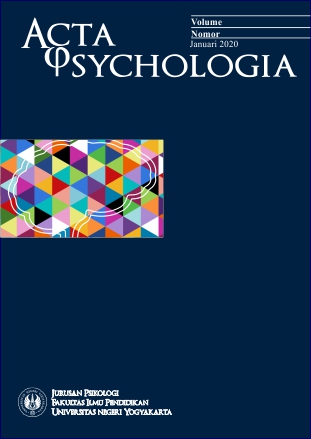Self-criticism dan prokrastinasi akademik pada mahasiswa di Daerah Istimewa Yogyakarta
DOI:
https://doi.org/10.21831/ap.v5i1.68441Keywords:
self-criticism, prokrastinasi akademik, mahasiswaAbstract
Selama ini penundaan mengerjakan tugas banyak dikaitkan dengan tuntutan diri untuk mencapai standar yang terlalu tinggi. Konsep menuntut diri untuk mencapai standar performa yang tinggi ini merupakan bagian dari konstruk self-criticism, bersama dengan ekspresi membenci diri ketika standar performa tersebut tidak terpenuhi. Penelitian ini mencoba mengkaji hubungan antara aspek yang dimiliki self-criticism dengan prokrastinasi akademik pada mahasiswa di Daerah Istimewa Yogyakarta. Pengambilan data kuantitatif dilakukan dengan accidental sampling pada 408 mahasiswa aktif dari berbagai perguruan tinggi di Daerah Istimewa Yogyakarta. Variabel prokrastinasi akademik diukur menggunakan adaptasi Tuckman Procrastinastion Scale (α=0,800) dan variabel self-criticism diukur dengan Self-criticism Scale (α=0,920). Hasil data diolah dengan analisis korelasi Pearson Product Moment menggunakan IBM SPSS Statistics 25. Hasil penelitian menunjukkan adanya hubungan positif antar kedua variabel dengan koefisien determinasi sebesar 0,518 dan kontribusi variabel self-criticism pada variabel prokrastinasi akademik adalah sebesar 0,268 atau 26,8%. Artinya, variabel self-criticism memiliki pengaruh kontribusi sebesar 26,8% terhadap variabel prokrastinasi akademik, yang mana 73,2% lainnya dipengaruhi oleh faktor-faktor lain di luar self-criticism.
References
Angela, L. (2020). Pengembangan alat ukur self-compassion: Tinjauan sistematis dan studi validasi. (Skripsi). Fakultas Psikologi Universitas Tarumanagara.
Anggunani, A. R., & Purwanto, B. (2018). Hubungan antara problematic internet use dengan prokrastinasi akademik. Gadjah Mada Journal of Psychology, Vol.4 No.1, 1-10.
Bahri, D. S. (2002). Strategi belajar mengajar. Jakarta: Rineka Cipta.
Burka, J. B., & Yuen, L. M. (2008). Procrastination, why do you do it, what to do about it now-Rev Ed. United States of America: Da Capo Press.
Burnam, A., Komarraju, M., Hamel, R., & Nadler, D. R. (2014). Do adaptive perfectionism and self-determined motivation reduce academic procrastination? Learning and individual differences 36, 165-172.
Castilho, P., & Pinto-Gouveia, J. (2011). Self-compassion: Validation study of the portuguese version of the self-compassion scale and its relation with early negative experiences, social comparison and psychopathology. Psychologica, 203-231.
Chen, B. B., Shi, Z., & Wang, Y. (2016). Do peers matter? resistance to peer influence as a mediator between self-esteem and procrastination among undergraduates. Frontiers In Psychology, 1529.
Dunkley, D. M., Berg, J. L., & Zuroff, D. C. (2012). The role of perfectionism in daily self-esteem, attachment, and negative affect. Journal of Personality, 80(3), 633-663.
Ellis, A., & Knaus, W. J. (1977). Overcoming procrastination. New York: Institute for Rational Living.
Fitriya, F., & Lukmawati, L. (2017). Hubungan antara regulasi diri dengan perilaku prokrastinasi akademik pada mahasiswa Sekolah Tinggi Ilmu Kesehatan (STIKES) Mitra Adiguna Palembang. Psikis : Jurnal Psikologi Islami, 2(1).
Flett, A. L., Haghbin, M., & Pychyl, T. A. (2016). Procrastination and depression from a cognitive perspective: An exploration of the associations among procrastinatory automatic thoughts, rumination, and mindfulness. Journal of Rational-Emotive & Cognitive-Behavior Therapy, 34(3), 169-186.
Gilbert, P., & Woodyatt, L. (2017). An evolutionary approach to shame-based self-criticism, self-forgiveness, and compassion. In E. L. L. Woodyatt, Handbook Of The Psychology Of Self-forgiveness (pp. 29-41). Springer International Publishing AG.
Gilbert, P., & Irons, C. (2004). A pilot exploration of the use of compassionate images in a group of self critical people. Memory, 12, 507-516.
Hamalik, O. (2001). Perencanaan pengajaran berdasarkan pendekatan sistem. Jakarta: PT Bumi Aksara.
Jadidi, F., Mohammadkhani, S., & Tajrishi, K. Z. (2011). Perfectionism and academic procrastination. Procedia - Social and Behavioral Sciences 30, 534-537.
Jia, J., Jiang, Q., & Lin, X. H. (2020). Academic anxiety and self-handicapping among medical students during the covid-19 pandemic: A moderated mediation model. Res. Sq., 1-22.
Kartadinata, I., & Tjundjing, S. (2008). I love you tomorrow: prokrastinasi akademik dan manajemen waktu. Anima, Indonesian Psychological Journal Vol. 23 No. 2, 109-119.
Kim, K. R., & Seo, E. H. (2015). The relationship between procrastination and academic performance: A meta-analysis. Personality and Individual Differences, 82, 26-33.
Knaus, E. (1992). Procrastionation. New York: Institute for Rational-Emotive Therapy.
Kurtovic, A., Vrdoljak, G., & Idzanovic, A. (2019). Predicting procrastination: The role of academic achievement, self-efficacy and perfectionism. International Journal of Educational Psychology, 8(1), 1-26.
Kusuma, L. W. (2010). Kecenderungan perilaku prokrastinasi akademik pada mahasiswa (Skripsi). Fakultas Psikologi Universitas Sanata Dharma Yogyakarta
Lueke, N., & Skeel, R. (2017). The effect of self-criticism on working memory in females following success and failure. Personality and Individual Differences vol.111, 318-323.
Mahardika, Y. & Yulianti, D. A. (2018). Hubungan antara kecanduan game online terhadap prokrastinasi akademik pada mahasiswa Yogyakarta. (Naskah Publikasi). Fakultas Psikologi dan Ilmu Sosial Budaya Universitas Islam Indonesia.
Mahasneh, A., Bataineh, O., & Al-Zoubi, Z. (2016). The relationship between academic procrastination and parenting styles among jordanian undergraduate university students. The Open Psychology Journal, 9(1), 25-34.
Manfredi, C., Caselli, G., Pescini, F., Rossi, M., Rebecchi, D., Ruggiero, G. M., & Sassaroli, S. (2016). Parental criticism, self-criticism and their relation to depressive mood: An exploratory study among a non-clinical population. Research in Psychotherapy: Psychopathology, Process and Outcome, 41-48.
Neff, K. D. (2011). Self-compassion: the proven power of being kind to yourself. New York: William Morrow Paperbacks.
Powers, T., Koestner, R., Zuroff, D., Milyavskaya, M., & Gorin, A. (2011). The effects of self- criticism and self-oriented perfectionism on goal pursuit. Personality and Social Psychology Bulletin, 37 (7), 964– 975
Putri, B. D. (2020). Pengaruh self-criticism terhadap perilaku prokrastinasi akademik pada mahasiswa Universitas Muhammadiyah Jember. (Skripsi). Universitas Muhammadiyah Jember.
Putri, H. S. (2019). Hubungan self management dengan perilaku prokrastinasi akademik pada mahasiswa bimbingan dan konseling Universitas Negeri Yogyakarta. (Skripsi). Fakultas Ilmu Pendidikan Universitas Negeri Yogyakarta.
Qadariah, S., Manan, S. H., & Ramdhayani, D. P. (2005). Gambaran faktor penyebab prokrastinasi pada mahasiswa prokrastinator yang mengontrak skripsi. Seminar Nasional Penelitian dan PKM: Sosial, Ekonomi, dan Humaniora, 119-126.
Rozental, A., Forsstrom, D., Hussoon, A., & Klingsieck, K. B. (2022). Procrastination among university students: Differentiating severe cases in need of support from less severe cases. New Perspectives on Procrastination, Volume II.
Sandra, K. I., & Djalali, M. A. (2013). Manajemen waktu, efikasi-diri dan prokrastinasi. Persona, Jurnal Psikologi Indonesia, Vol. 2, No. 3, 217-222.
Saputra, A., & Khairani, K. (2021). Relationship between parent' social support and student academic procrastination completing assignments at SMAN. Jurnal NeoKonseling Vol. 3, No. 2, 9-15.
Sari, W., & Fakhruddiana, F. (2019). Internal locus of control, social support and academic procrastination among students in completing the thesis. International Journal Of Evaluation And Research In Education (IJERE), 8(2), 363-368.
Shahar, G. (2016). Criticism in the self, brain, relationships, and social structure: Implications for psychodynamic psychiatry. Psychodynamic Psychiatry 44(3), 395-421.
Sherry, S. B., Stoeber, J., & Ramasubbu, C. (2016). Perfectionism explains variance in self-defeating behaviors beyond self criticism-evidence from a cross-national sample. Personality and Individual Differences 95, 196-199.
Sirois, F. M. (2004). Procrastination and intentions to perform health behaviors: The role of self-efficacy and the consideration of future consequences. Personality and Individual Differences, 37(1), 115–128.
Solomon, L. J., & Rothblum, E. D. (1984). Academic procrastination: Frequency and cognitive-behavioral correlates. Journal of Counseling Psychology, 503-509.
Steel, P. (2007). The nature of procrastination: a meta-analytic and theoretical review of quintessential self-regulatory failure. Psychological Bulletin Vol.133(1), 65-94.
Sugiyono. (2017). Metode penelitian kuantitatif, kualitatif, dan r&d. Bandung: Alfabeta.
Tarmizi, T., Navissa, A., Dian, F., Rahma, F., & Retno, A. (2019). Self-criticism scale. Science, Technology, Engineering and Mathematics Learning International Forum (1st STEMEIF), 89-94.
Thompson, R., & Zuroff, D. C. (2000). The levels of self-criticism scale. Poster session: APA: Assessment and Diagnosis. Washington COnvention Center, Washington DC, USA.
Vanea, M., & Ghizdareanu, E. (2012). High standards and self-criticism in university environment – gender, age, and learning context differences. Procedia - Social and Behavioral Sciences 33, 895-899.
Wahyuni, E., Fitri, S., & Cahyawulan, W. (2022). Emotion regulation difficulties and self-criticism among university students during covid 10 pandemic in Indonesia. International Journal Of Education, Psychology, and Counselling, 7(45), 210-221.
Wardani, R., Adelina, I., & Santoso, J. A. (2021). Prediticing academic procastinantion in students: Perfectionism, general self-efficacy, and sociodemographic factors. Indigenous: Jurnal Ilmiah Psikologi, 6(3), 49-59.
Wirajaya, M. M., Padmadewi, N. N., & Ramendra, D. P. (2021). Investigating the academic procrastination of EFL students. JPBII Vol.8 No.2, 67-77.
Zimmermann, P., & Iwanski, A. (2014). Emotion regulation from early adolescence to emerging adulthood and middle adulthood: Age differences, gender differences, and emotion-specific developmental variations. International Journal Of Behavioral Development, 38(2), 182-194.
Zusya, A. R., & Akmal, S. Z. (2016). Hubungan self-efficacy akademik dengan prokrastinasi akademik pada mahasiswa yang sedang menyelesaikan skripsi. PSYMPATHIC: Jurnal Ilmiah Psikologi, 3(2), 191-200.
Downloads
Published
How to Cite
Issue
Section
License
Acta Psychologia allows readers to read, download, copy, distribute, print, search, or link to its articles' full texts and allows readers to use them for any other lawful purpose. The journal allows the author(s) to hold the copyright without restrictions. Finally, the journal allows the author(s) to retain publishing rights without restrictions
- Authors are allowed to archive their submitted article in an open access repository
- Authors are allowed to archive the final published article in an open access repository with an acknowledgment of its initial publication in this journal

This work is licensed under a Creative Commons Attribution-ShareAlike 4.0 Generic License.










